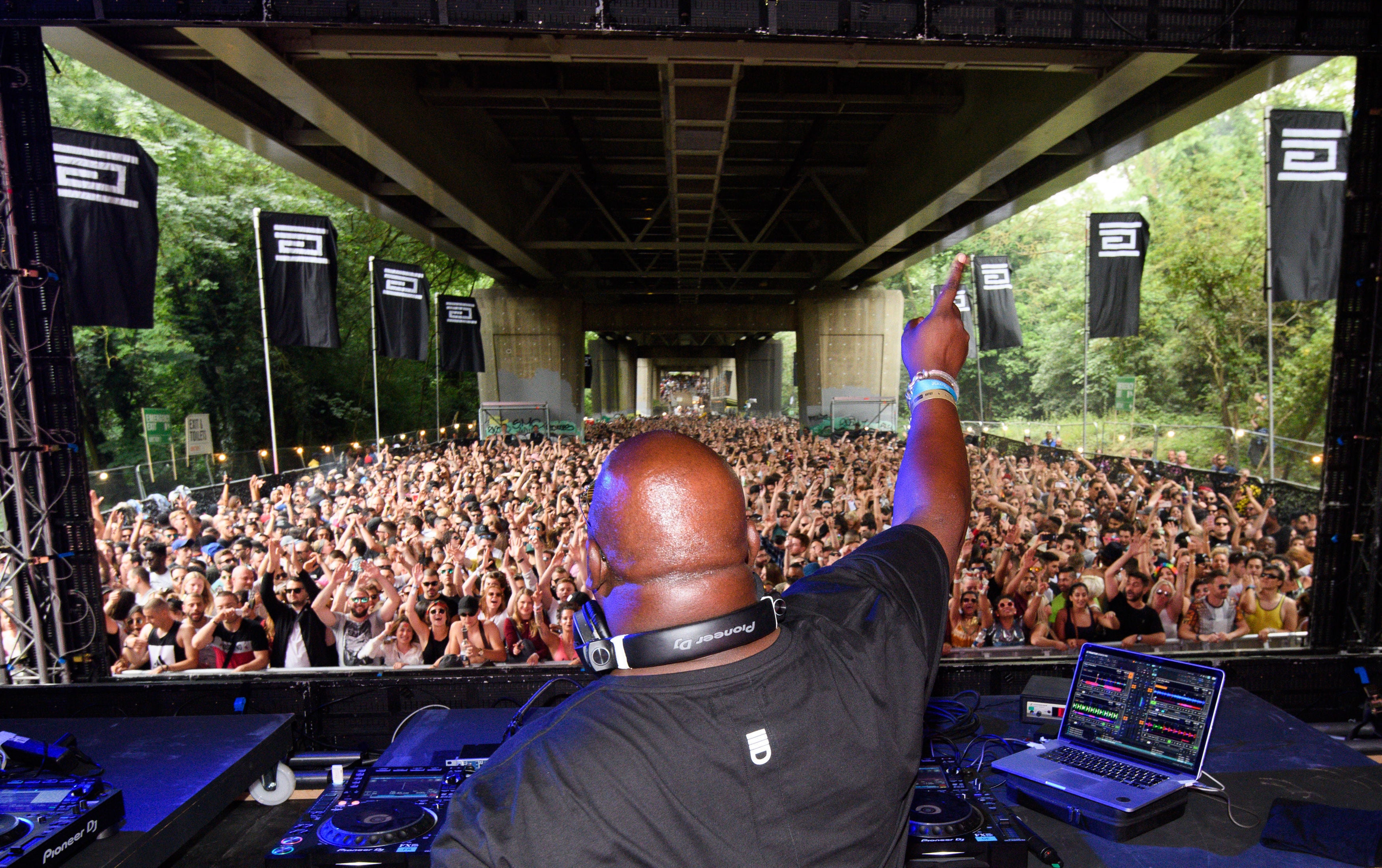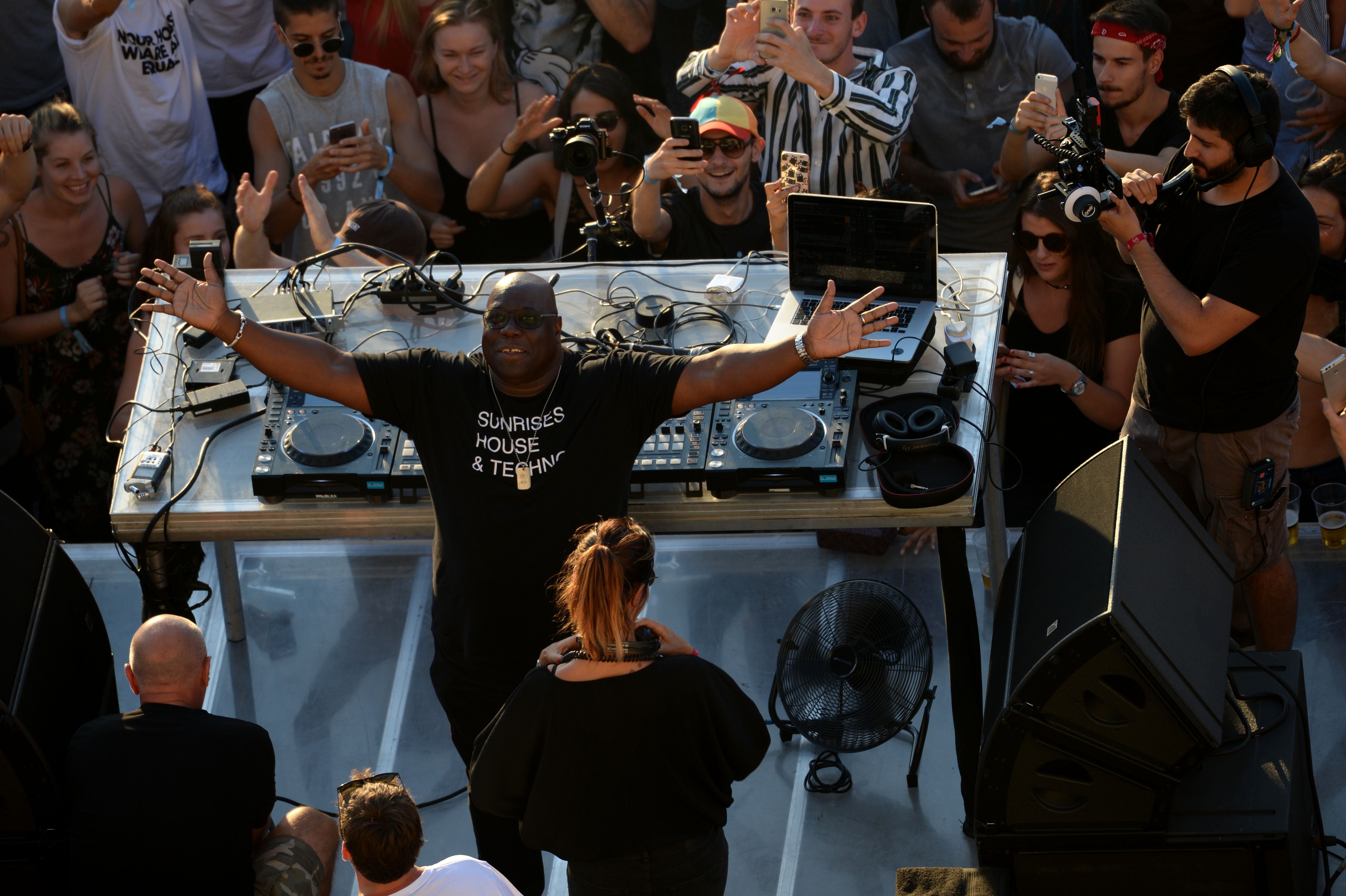Carl Cox: ‘I’ve always been a renegade, but mindful of others too’
After four decades of globe-hopping DJ sets, the three-deck wizard is publishing his memoir ‘Oh Yes, Oh Yes!’. He tells Kevin E G Perry about his journey from illegal raves to playing the Houses of Parliament, losing himself in the dust at Burning Man and witnessing murders on the dance floor in Venezuela


If you’ve raised your hands in ecstasy on a dance floor in the past 44 years, sweat sticky on your skin, electricity crackling in the air and Carl Cox behind the decks, you’ll probably be able to guess what it’s like to have a conversation with the man himself.
Even over a shaky video connection, the three-deck wizard gives off enough positive vibes to heat a moderately sized flat. He’s a 59-year-old with the hyperactive energy of a toddler on a sugar bender. David Guetta, being French, calls this infectious enthusiasm of Cox’s “joie de vivre”. Another way of putting it would be the joyous exclamation that has become Cox’s signature shout-out, the same four little words plastered across the cover of his new memoir: “Oh Yes, Oh Yes!”
The book is a rollicking chronicle of a life lived large, but it begins with a moment of tragedy. In November 2007, Cox was DJing at a festival in the Venezuelan capital Caracas when gunfire broke out on the dance floor. “There were fireworks going off, so then the next cracks I hear I’m thinking: ‘Oh, more of the same,’” he remembers. “Then I looked down and could see everybody scattering and the people on the floor and the blood.”
As Cox later learnt, word had spread that a pair of local gang members were fans of his, leading a rival gang to choose his show as the location for a hit on the pair and their wives. All four were shot dead, while another nine people were injured in the crossfire. By the time Cox had crawled off stage and barricaded himself in a room backstage, he was convinced he’d never DJ again. “We came out and saw them dead on the floor before we were bundled away,” he says. “Nothing prepares you for something like that.”
In the immediate aftermath of the shootings, Cox quit his South American tour and got on the first plane to see his parents in Barbados. He mulled retirement, but after just a week, he picked up the tour where he left off. He says it wasn’t so much his love of music that brought him back as the people he knew would be coming to dance and lose themselves with him. “When I did the next event, the people there knew what had happened and how traumatic it had been,” he remembers. “There was a bit more security, but I said: ‘I don’t want a barrier. I don’t want bulletproof glass. I don’t want anything. I want me and the people to be there.’ That night was incredible. I could feel the support and the love of the people, and they held me up to go through that.”

Cox has been playing music to people since he was a 10-year-old growing up in Carshalton, south London. He started at home with his dad’s soul records before progressing to taking a turntable with him to school so he could DJ during break times. As he got older, he began to build his own sound system, funded by paper rounds and local handyman work, and set about offering his disco services to weddings, bar mitzvahs, scout troops and anyone else who’d have him. “I started taking it seriously when I was 15 or 16 years old, semi-professionally, and then went professional when I was 21 or 22,” he remembers. “Since then, I’ve always been working. Every weekend until the pandemic, when it basically fell off a cliff.”
By the end of the 1980s, Cox was a fixture on the illegal rave scene, dubbed “The People’s Choice” because, unlike most DJs, he wasn’t associated with a particular club or radio station. He’d also earned the nickname “the three-deck wizard” for his ability to mix three turntables simultaneously. He played a series of notorious outdoor parties, including the White Waltham rave of 1989, which was quickly demonised by the tabloid press.
He empathises with the young people who hosted their own illegal parties during lockdown, but is quick to point out that the circumstances were very different. “I’ve always been a renegade,” he says with a laugh. “I’ve always been the type to look up and down the street and then say: ‘Let’s go!’, but I’m still mindful of others. We always had to watch our backs because of what we were doing, especially with the illegal rave parties, but back in the day we never thought in our lifetime that something like this [pandemic] would ever happen. I think I would’ve treated this a little bit differently.”
In those early days, Cox was aware that he was often tailed on his way to raves by officers from the police’s Pay Party Unit, and he believes his phone was tapped. On one occasion he was even the subject of a sting, when undercover officers booked him to play a party that turned out to be an elaborate attempt at a drug bust. The charges against Cox were thrown out when the eventual search turned up a grand total of zero drugs.
Enjoy unlimited access to 100 million ad-free songs and podcasts with Amazon Music
Sign up now for a 30-day free trial. Terms apply.
ADVERTISEMENT. If you sign up to this service we will earn commission. This revenue helps to fund journalism across The Independent.
Enjoy unlimited access to 100 million ad-free songs and podcasts with Amazon Music
Sign up now for a 30-day free trial. Terms apply.
ADVERTISEMENT. If you sign up to this service we will earn commission. This revenue helps to fund journalism across The Independent.
After the 1994 Criminal Justice Act brought an end to free parties, Cox continued to play clubs and festivals and watched with delight as ravers became clubbers and dance music culture took over the mainstream. Before long, he was being hailed as a trailblazing hero of the scene, invited to play everywhere from Stonehenge to a charity gig at the Houses of Parliament.
Playing the latter venue, Cox says, was a particularly surreal experience after being targeted by the authorities for so much of his early career. “You just can’t write this stuff!” he says with a chuckle. “Weren’t these the same guys that in that very room over there passed a Criminal Justice Act against having repetitive beats, and if you had more than five people dancing you were gonna get locked up? It was bizarre.”

By the start of the 2000s, Cox was a global superstar. He saw in the millennium DJing at Bondi Beach in Australia at midnight, before jumping on a plane to Honolulu, Hawaii, where he did it all again. His “Music is Revolution” residency at Space Ibiza ran for 15 years, becoming the stuff of DJ legend before the superclub shut up shop in 2016 and he closed it out with an epic nine-hour set.
These days, if there’s one dance floor he’s itching to get back to it’s one of his own design. Cox runs his own camp at Burning Man from a Bedouin tent. Known as the Playground, it is beloved by those who’ve ventured into Nevada’s Black Rock Desert to find it for its peerless sound system and unforgettable all-night parties. The pandemic has put paid to the whole event for the time being. Cox made his first pilgrimage to Burning Man in 2008, when he was still reeling from the shootings he’d witnessed in Venezuela. He has been a devotee ever since.
“You roll up into the desert and something’s always going on,” he explains, his face lighting up at the memory. “Often you don’t even know who’s playing, and it doesn’t matter. Sometimes I’ll be unrecognisable as who I am, which is great because I’m just somebody else that loves to be messing around in the bloody dust. We’re all in it together, and I love that camaraderie. I didn’t think I was gonna end up being a Burner, but now I’m so in, it’s not funny. When it comes back, I’m first in the queue.”
When Cox first started spinning records back in Carshalton, there was no such thing as a globe-trotting superstar DJ. He created the job for himself through sheer dedication to the dance floor and an iron-clad belief in the music he was playing, even when ravers themselves weren’t so sure. “There was no textbook to anything we were doing,” he remembers. “I used to clear dance floors with house music. I’d be going: ‘Come back! It’s gonna be popular one day! Listen to me, you idiots! You’re gonna be having the time of your life!’ Eventually, one by one, they did come back. I felt like I had to put my first foot forward. This was something I had foresight on, and here I am, over 30 years later, still going!”
Not just still going, but still sharing the music he loves with that same sense of contagious excitement that’s always defined him. Even after all these years, Carl Cox remains very much the people’s choice. Oh yes, oh yes!
Oh Yes, Oh Yes! by Carl Cox, published by White Rabbit, is out now.
Join our commenting forum
Join thought-provoking conversations, follow other Independent readers and see their replies
Comments
Bookmark popover
Removed from bookmarks